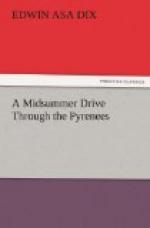Close at the side of the path stands a tiny roadside oratory. On the walls of this little shrine, which (or its predecessor) has stood here for three hundred years, one might formerly read in stilted French the following astonishing inscription, ignoble witness to human platitude, as M. Joanne calls it:
“Arrest thee, passer-by! admire a thing thou seest not, and attend to hear what it is thou shouldst admire: we are but rocks and yet we speak. Nature gave us being, but it was the Princess Catherine gave us tongues. What thou now readest we have seen her read; what she has said we have listened to; her soul we have upborne. Are we not blessed, passer-by? having no eyes, we yet have seen her! Yet blessed thou too, in having seen her not; for we rocks were lifeless and the sight transformed us into life; but as for thee, traveler, thy transformation would have been into lifeless rock!”
As our routes converge, mine descending, the other rising, the valley narrows to a gorge. In its depths, a hundred and fifty feet or more below, the torrent is noisily roaring, and at the other side, half way up, the carriage-road is built out from the almost perpendicular wall of the Gourzy. We draw nearer, and at length I cross, high above the stream, by a rude wooden bridge, and rejoin the main road. The slope I have quitted steepens now into a precipice, and the two sides of this ravine move closer and closer together, their bare limestone brows a thousand, two thousand, feet above the road. I vividly recall the Via Mala in Switzerland, as I lean over the stone parapet and push down a heavy stone to crash upon the rocks of the torrent far beneath.
The toiling breack rejoins me, and the road cuts in through the gorge for some distance farther. Patches of snow are now seen on some of the summits approaching. Then we round a corner at the left, the valley opens out, though very slightly, and soon we see ahead the closely set houses of the Baths of Eaux Chaudes.
* * * * *
We pause before a plain, fatherly hotel, and a motherly landlady appears at once to welcome us. We are won at once by Madame Baudot. Her benignant face is a benediction. She leads us in through the low, wide hallway, past the little windowed office at the end, and turning to the left into a short corridor brings us out to a set of rooms in the new extension. As we step out upon the tiny balconies at the windows, we cannot forbear exclaiming at the charm of their situation. We are directly above the torrent, which chafes along perhaps fifty feet below, and the balconies jut out over the water. Beyond it are the cliffs, rising huge before us, wooded high, but bare and bald near the top; up and down the valley the eye ranges along their fronts. The rooms, simple but exactingly clean, are dainty with dimity and netted curtains and spreads. The whole effect is so home-like and restful, the relief of the contrast so great from plain and city and the rush of trains, that involuntarily we sigh for a month to spend at Eaux Chaudes.




